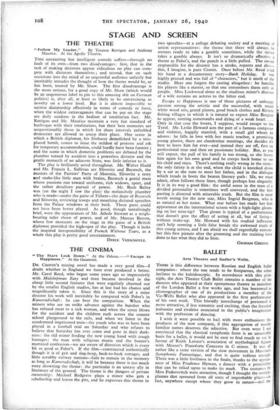THE CINEMA
• " The Stars Look Down." At the Odeon.—" Escape to Happiness." At the Gaumont.
DR. CRONIN'S mining novel has made a very good film—I doubt whether in England we have ever produced a better. Mr. Carol Reed, who began some years ago so impressively with Midshipman Easy and then became involved in the cheap little second features that were regularly churned out by the smaller English studios, has at last had his chance and magnificently taken it. Since this is the story of a mine disaster his work will inevitably be compared with Pabst's in Kameradschaft : he can bear the comparison. When the miners who are on strike advance against the butcher who has refused meat to a sick woman, and when the syren blows for the accident and the children rush across the cement school playground to the rails, and when we listen to the condemned imprisoned men—the youth who was to have been played in a football trial on Saturday and who refuses to believe that Saturday has ever come and gone in their dark- ness : the old miner feeding the new young hand with cough lozenges : the man with religious mania and the boozer's muttered confession—we are aware of direction which is every bit as good as Pabst's. If the film—constructed authentically though it is of grit and slag-heap, back-to-back cottages, and little scrubby railway stations—fails to remain in the memory as long as Kameradschaft, it will be because there is too much story drowning the theme: the particular is an uneasy ally in literature of the general. The theme is the dangers of private ownership : Michael Redgrave plays a miner who gets a scholarship and leaves the pits, and he expresses this theme in two speeches—at a college debating society and a meeting of union representatives : the theme that there will always be owners ready to take a gamble sometimes, while the miner takes a gamble always. It isn't so dramatically effective a theme as Pabst's, and the punch is a little pulled. The owner responsible for the disaster has a stroke, repents and dies— this, I imagine, is pure Cronin. Once before Mr. Reed tried his hand at a documentary story—Bank Holiday. It was highly praised and was full of "characters," but it smelt of the studio. Here one forgets the casting altogether : he handles his players like a master, so that one remembers them only as people. Miss Lockwood alone as the studious miner's disaster of a wife remains an actress to the bitter end.
Escape to Happiness is one of those pictures of unhappy passion among the artistic and the successful, with smart white wood sets, grand pianos, good beach dothes and Riviera fishing villages in which it is natural to expect Miss Bergner to appear, turning somersaults and dying of a weak heart. Only in that case the lovers, I suppose, would escape to the Tyrol. Mr. Leslie Howard acts the part of a famous composer and violinist, happily married, with a small girl whom he adores : he falls in love with her music teacher, a promising young pianist, there are clandestine meetings, she decides it's best to leave him for ever—and instead they are off, first on professional tour and then on passionate holiday. But, as you will expect, the pull of his family is too strong, so she leaves him again for his own good and he creeps back home to see his child and stays. There's nothing really wrong in the story: the only falsity is at the end, when the child is knocked down by a car as she runs to meet her father, and in the dialogue which treads in boots the beaten literary path: life, we must admit, often follows these lines, though perhaps less elegantly. It is in its way a good film: the awful sense in the man of a divided personality is sometimes well conveyed, and the first parting is directed with miserable truth. But the film is most worth seeing for the new star, Miss Ingrid Bergman, who is as natural as her name. What star before has made her first appearance on the international screen with a high-light gleam- ing on her nose-tip? That gleam is typical of a performance that" doesn't give the effect of acting at all, but of living— without make-up. Mr. Howard with his studied inflexions can't help seeming a little false beside the awkward truth of this young actress, and I am afraid we shall regretfully remem- ber this first picture after the grooming and the training have done to her what they did to Sten.
GRAHAM GREENE.






































 Previous page
Previous page